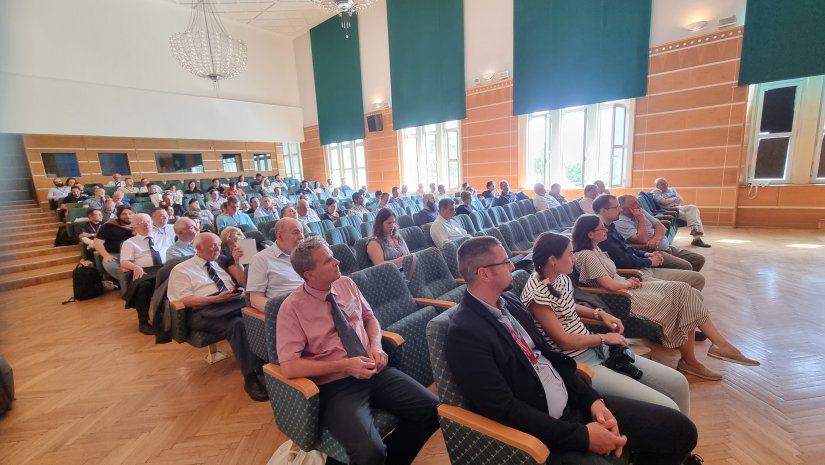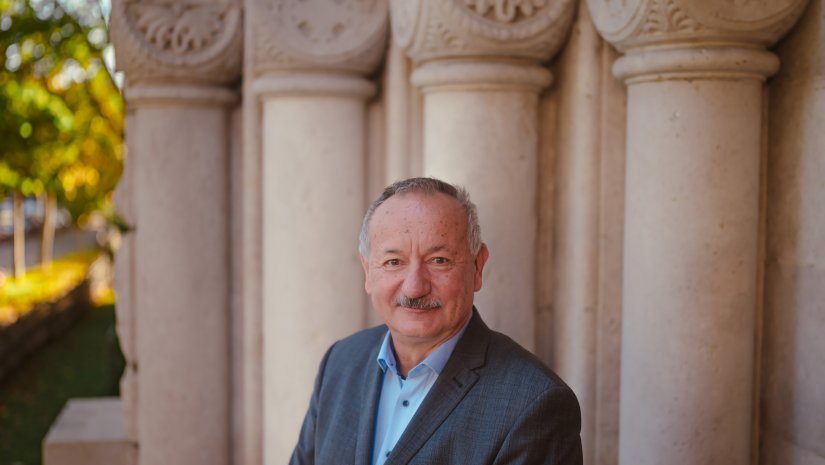Living to a hundred is a dream for many. How can we achieve this? What is the secret of youth? Is exercise the key? Or do we need to just change our diet? Should we use magic ingredients? Or a combination of them? What is the secret? These questions were answered by Dr. Zoltán Szabó, assistant professor at the Faculty of Health Sciences of the University of Pécs, in his lecture „How to live to 100? The Secrets of the blue zones" at the Researchers' Night on 27 September.
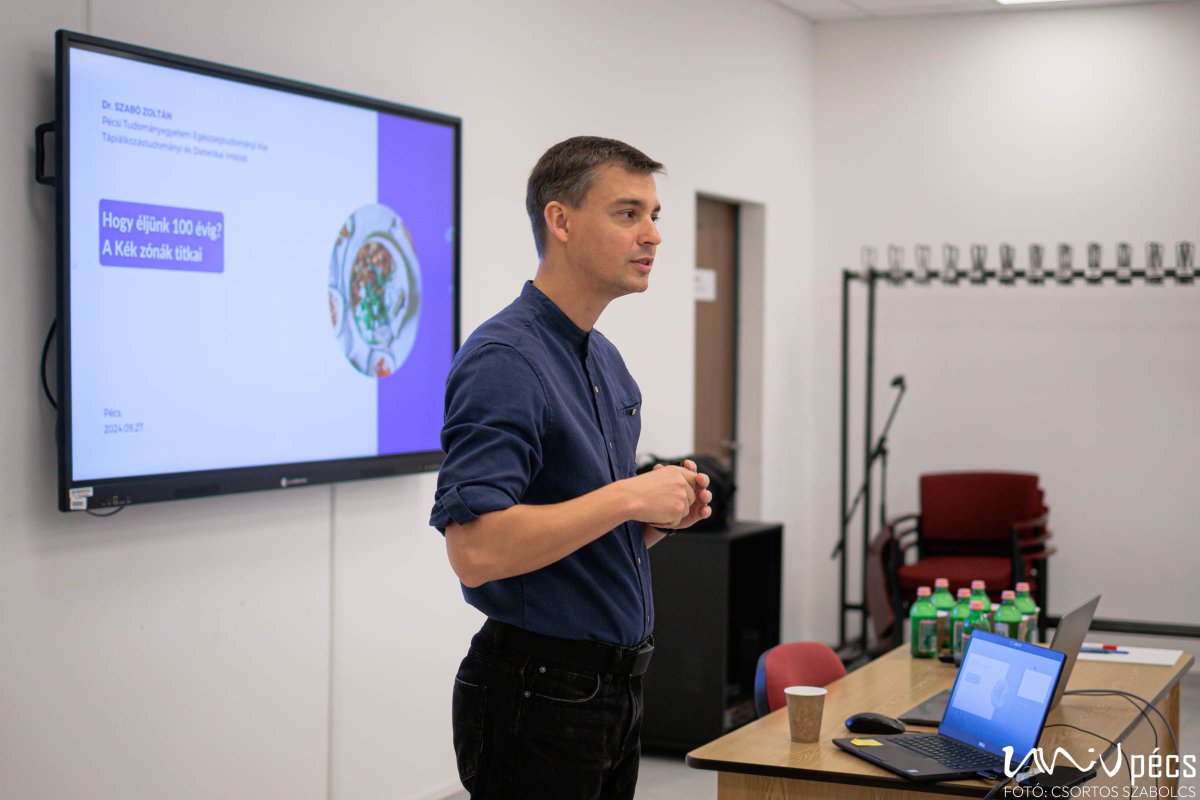
In order to find the answers to these questions, we need to ask the following question: What is health? „Everyone defines this term differently. Let's get to the gym, boys and girls." – Dr. Zoltán Szabó, assistant professor at the Faculty of Health Sciences, began his presentation. The researcher then added that
in today's world we are chasing a distorted image, fuelled by the toxic atmosphere of social media, which for most of us creates a lifelong sense of dissatisfaction.
This false image is compounded by the mentality that the key to health is the consumption of various dietary supplements such as protein powders, bulking agents and vitamins. And when we get sick? Off to the doctor, he prescribes a few pills, and the problem is taken care of. According to the presenter, this has created a misconception about health.
„Health is not sterile. Health has the smell of fruit" - we read on the slide, a quote from Béla Hamvas,
„Now you know everything, the lecture could end here, but there are still a few more slides to go", joked the assistant professor.
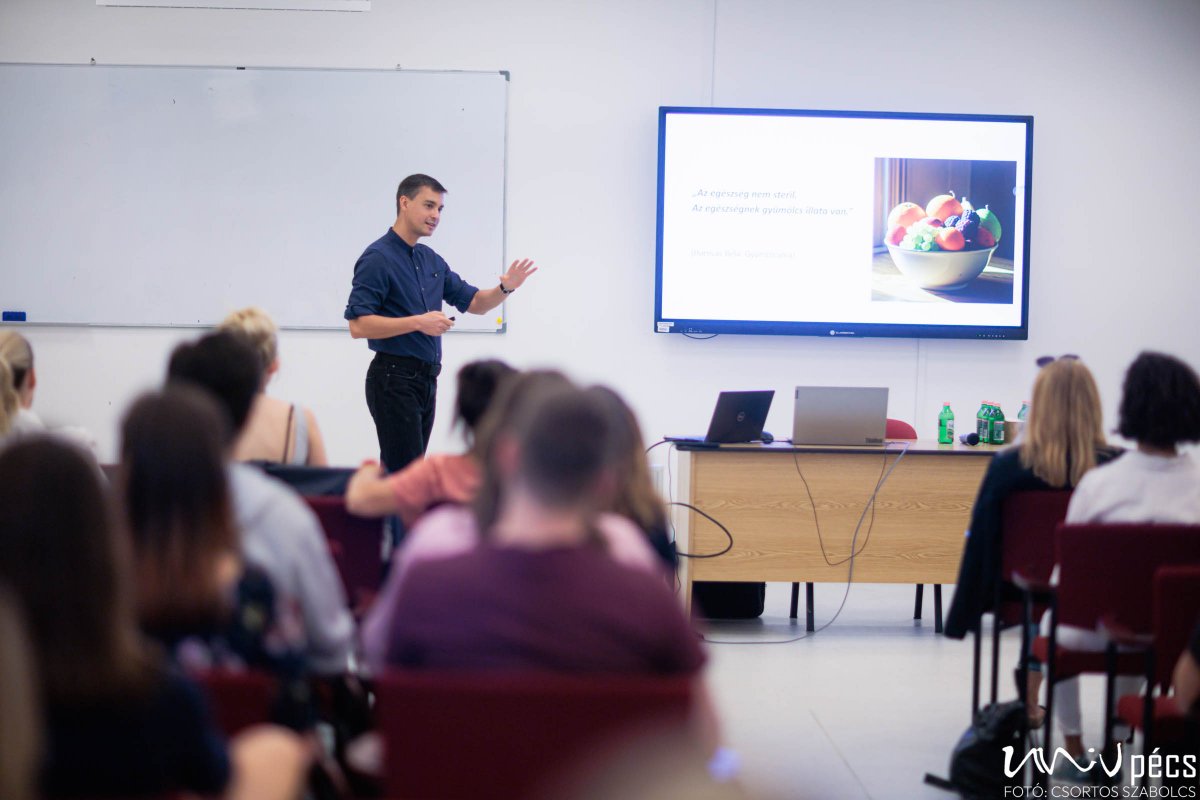
If we take a closer look at our lifestyle, we can discover many interesting things.
Dr. Zoltán Szabó pointed out that a large proportion of our health problems are actually caused by our everyday habits.
We don't exercise, we don't rest enough, we don't look after each other and we are not moderate. These are all things that can show up in any of our lives. Think about spending most of the day in the car, in front of a computer or phone. We stay up all night, overloading ourselves with work - whether it's making money, jockeying for position, or even noble goals like fighting for our families. We have developed a culture where we make friends based on interests and look for what we can get out of every relationship. We reach up and we step down - and we often do.

The issue of moderation is particularly important in this context. Many people think that " you can have everything in moderation", but is this really the case? "Can we smoke in moderation?" - asked the speaker, and then continued:
"The new approach to moderation is not only about minimising the bad things, but also about finding healthy proportions in the good things.
Physical activity, for example, is essential for a healthy lifestyle, but overdoing it can also be harmful. And one of the biggest problems in nutrition is highly processed foods, which lose their beneficial nutrients. In the basic American diet,
80% of the calories consumed come from highly processed foods.
This is a staggering proportion and shows the extent to which dietary habits are being affected by the rise of processed foods. In Hungary, we are perhaps in the worst situation ever."

As mentioned at this year's first Alumni workshop, the average person consumes around 80 tonnes of food in their lifetime.
The assistant professor stressed that we have to be careful what those 80 tonnes are made of, because not all diets can last up to 100 years.
"Obviously there are risk factors in your life that cannot be changed. For example, you get older, there are gender differences of that kind, and there are also some risk factors in genetics that seem less modifiable, but for example whether or not you smoke is modifiable. Whether someone is physically active or not is also modifiable," he added.

Alcohol and tobacco consumption, as well as a sedentary lifestyle and an unhealthy diet, play a major role in the development of chronic diseases,
not only in the United States but also in Europe.
Data from both the UK and Sweden show that people's quality of life and life expectancy are significantly reduced if they are physically inactive, smoke, drink excessive amounts of alcohol or eat too little fruit and vegetables. In the UK, for example, people who are inactive and lead unhealthy lifestyles can be up to 12 years older biologically than their chronological age would suggest.
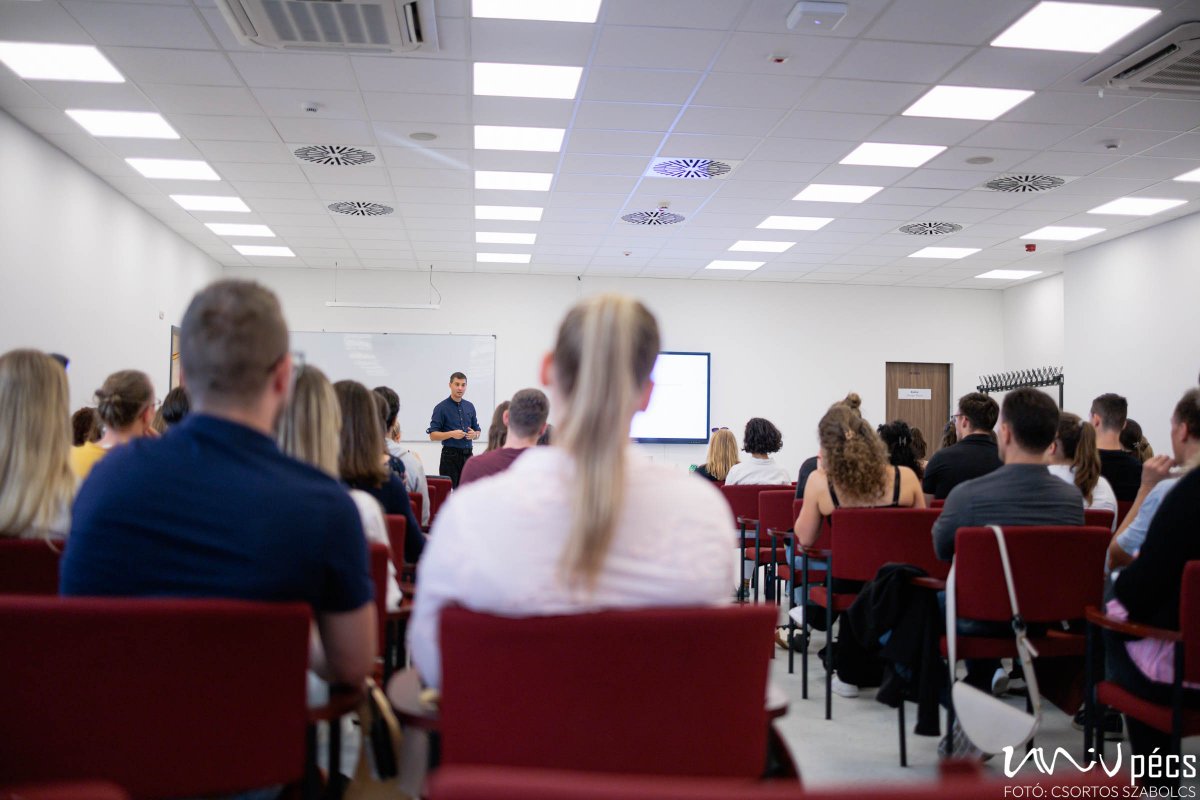
And a study carried out in Sweden shows that
79% of heart attacks could be prevented by a healthy lifestyle. This underlines that the majority of
death risks in the western world are linked to our lifestyle.
A Dutch study in 2009 found that 80% of chronic diseases could be prevented by the correct application of four basic lifestyle factors - such as not smoking, regular physical activity, maintaining a healthy weight and eating right.
So the key message is that in most cases we have control over our health, and by making the right choices we can significantly reduce the risks. If these lifestyle changes were offered as a cure, many people would be willing to pay a significant price for them, but the good news is that they are available to everyone. This is illustrated by the emergence of certain blue zones, one of the cornerstones of which is a 1999 study in Sardinia, which highlighted the fact that
there are 13 centenarians per 100,000 inhabitants, an unusually long life expectancy.
This is why researchers have started to focus their attention on this topic. Over the years, several studies have shown that surprisingly more centenarians live or have lived in certain geographical locations than in others. Five such areas have been identified:
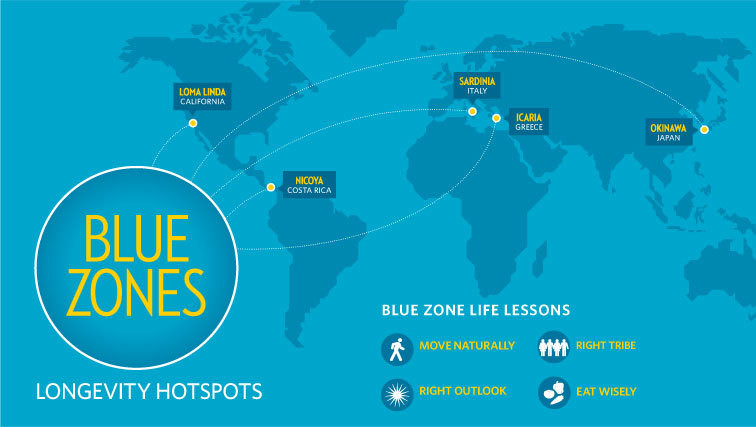
Source: World Economic Forum
The concept of blue zones identifies geographical areas where people live exceptionally long and healthy lives. What people living in these zones have in common is that their lifestyle and their diet is very different from that of the Western world. For example, their consumption of processed foods and animal products is minimal, while their diet is based mainly on plant-based foods.
"If we take a deeper look at the lifestyles of the inhabitants of the blue zones and draw lessons that we can incorporate into our own daily lives, we can become a kind of blue zone ourselves, if I may say so," said Dr Zoltán Szabó.
In the US example, there is the paradox that the country with the highest health spending in the world is unable to ensure a long and healthy life for its citizens, as shown by the low life expectancy ranking of the United States. This raises the question of whether economic expenditure and quality of life are not necessarily proportional, especially when we talk about healthy lifestyles.
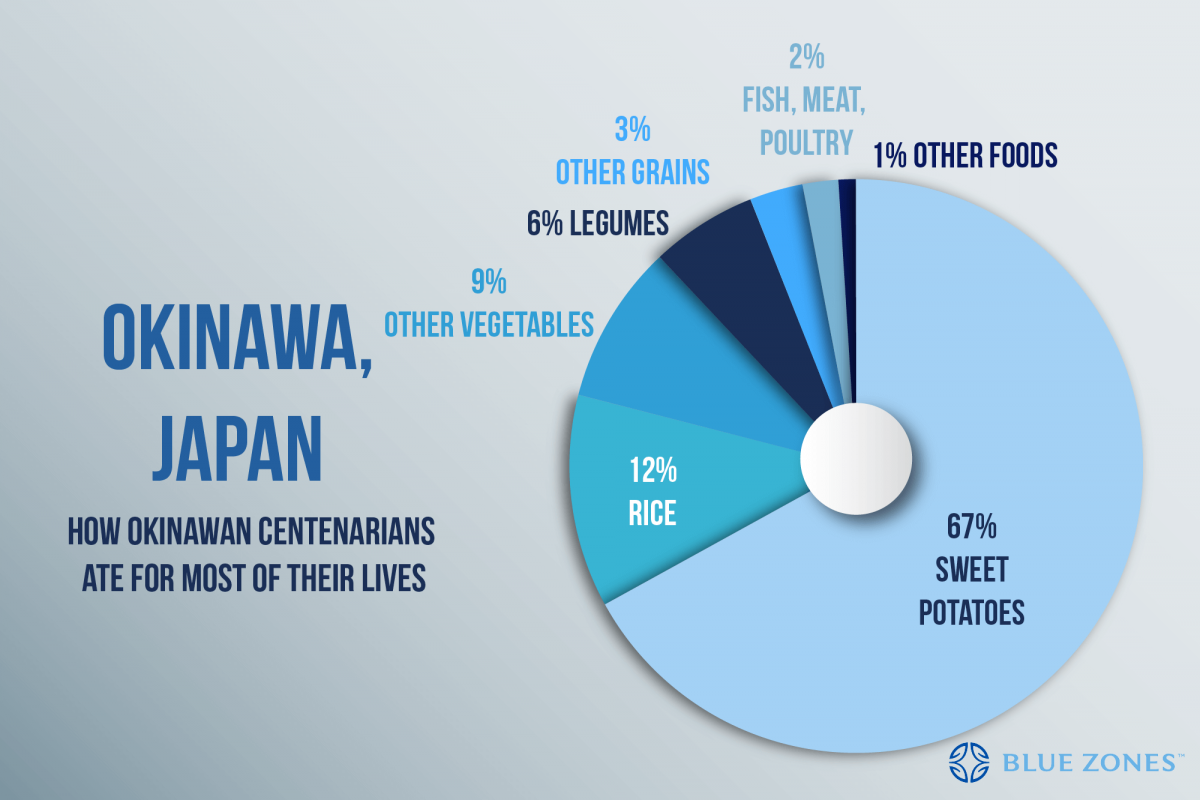
Source: Blue Zones®
One of the lessons we can learn from the lifestyle followed by the inhabitants of the blue zones is that
a plant-based diet and the consumption of natural, minimally processed foods pay off in terms of health in the long run.
For example, these zones have a very low consumption of animal products and a predominance of local, naturally sourced ingredients. In Okinawa, for example, sweet potatoes play a significant role in the diet, while in other areas whole grains and pulses are predominant.
"The studies and research looking at the habits of these communities confirm that our lifestyles have a drastic impact on our life expectancy.
A study drom 2001, for example, showed that life expectancy can be extended by up to ten years if the right dietary and lifestyle changes are made.
These include a plant-based diet, regular exercise, stress management, and maintaining close family and community ties," the assistant professor stressed.
Comparing the habits of residents of longevity hotspots, the researchers drew the following conclusions:
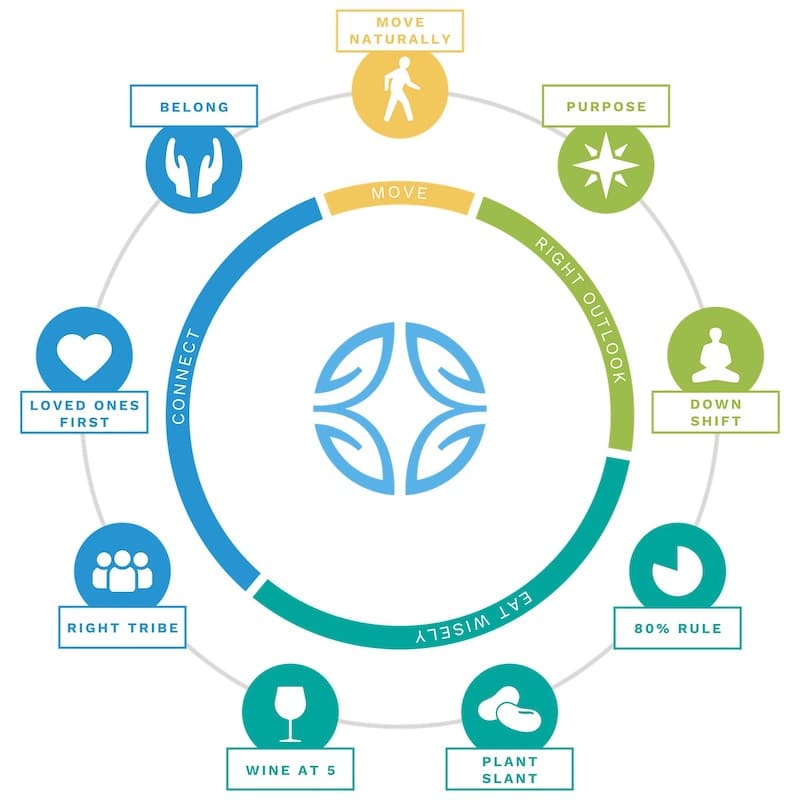
Source: Blue Zones®
Here are the basic principles for blue zone residents:
- Natural movement: blue zone residents do not do intensive exercise or go to the gym, but stay active naturally. They incorporate exercise into their daily routine, for example by gardening, walking, doing chores.
- Life purpose (Ikigai/Okinawa, Moai/Sardinia): people with a life purpose live longer. Knowing why you get up in the morning can extend your life by up to 7 years. This purpose in life appears in all cultures, Okinawans call it "ikigai", Sardinians "moai".
- The 80% rule: According to the "harahachi bu" principle followed by Okinawans, people only eat until they are 80% full, not completely full. This simple practice helps maintain a healthy weight.
- Plant-based diet: the diet of people living in blue zones is mainly plant-based, with a high consumption of vegetables, fruits, pulses and nuts. Meat is also present, but rarely, at most a few times a week, in small portions.
- Moderate wine consumption: many blue zone inhabitants, such as Sardinians and Ikarians, drink wine regularly, but always in moderation and usually in company. Social interaction and moderation are also central here.
- Belonging: people in blue zones have strong community and family ties. Regular religious or spiritual activities and family gatherings strengthen social support, which contributes to longevity.
- A loving community: people in blue zones support each other, whether they are friends or part of a wider community. Strong social relationships are a foundation for happiness and longevity.
- Focus on family and friends: family ties are very important. People in blue zones spend a lot of time with loved ones, and often several generations live together, providing close emotional support.
Dr. Zoltán Szabó specifically stressed that point 6 is not entirely true. According to the WHO statement from 2023, there is no safe level of alcohol that can be consumed without harm to health. Alcohol is in the same group of carcinogens as plutonium and tobacco smoke, which means that it has been shown to increase the risk of cancer, regardless of the amount consumed.

Source: Qubit
Statistics show that access to alcohol is extremely easy in Hungary and a significant proportion of the population is affected by alcohol-related problems, with more people suffering from alcohol dependence than in Russia, for example. It is a social phenomenon that affects families and human lives, so it may not be the right message to tell people to "just have a little drink."
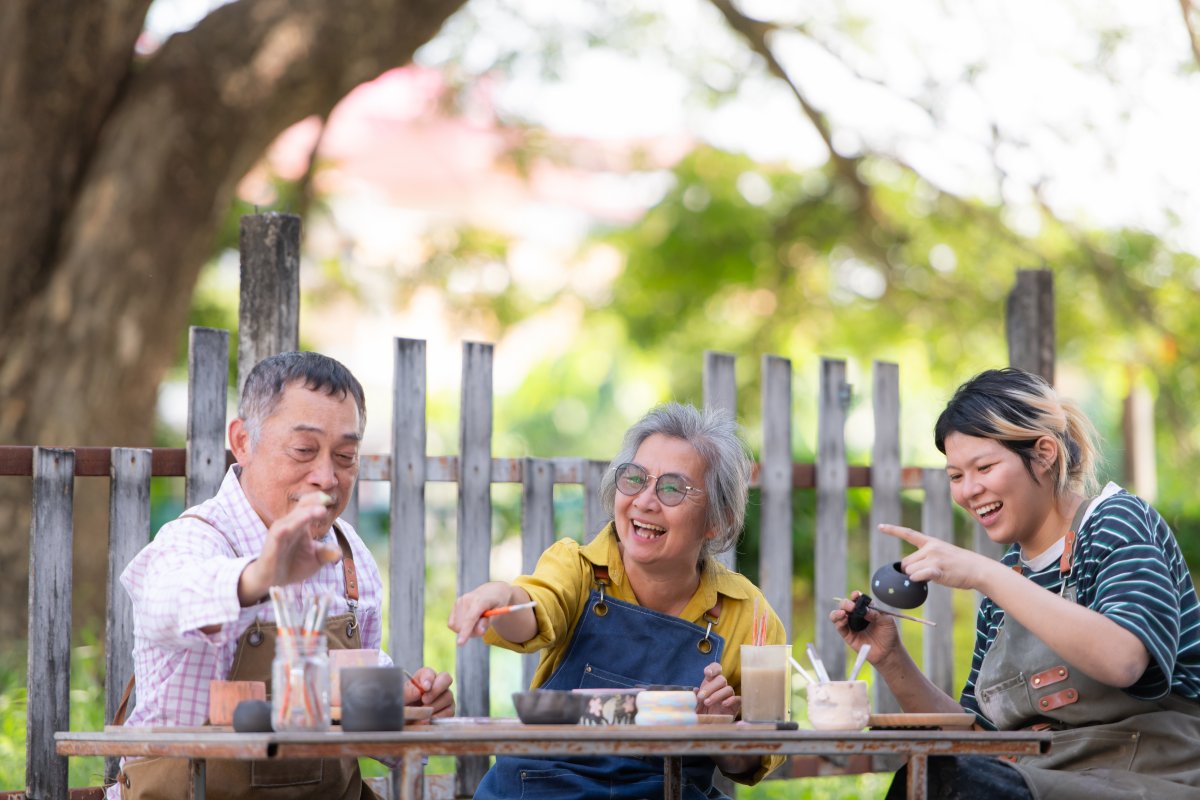
The secret to blue zones lies not in a magical recipe, but in simple but consistent lifestyle habits. The principles of the residents of the longevity hotspots all contribute to a long and healthy life. Not only do these people live long, they stay active and happy for the rest of their lives, fuelled by a balanced lifestyle and social harmony. The example of the blue zones teaches us that to improve quality of life, it is worth returning to simple, human values and habits.




